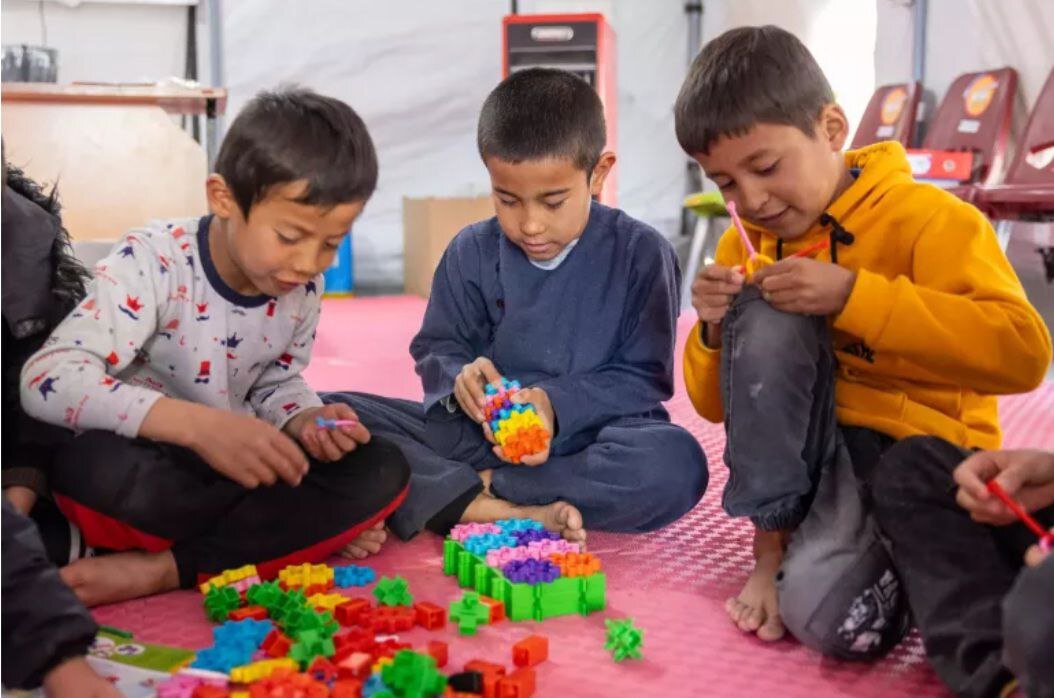IRCS, UNICEF hold workshop to support children’s mental health

TEHRAN -The Iranian Red Crescent Society (IRCS) and the United Nations Children’s Fund (UNICEF) have organized a workshop to support children’s mental health through games.
The workshop, titled ‘Structured Play, Games in Child-Friendly Spaces’, was held from November 16 to 20 in Bushehr, southern Iran, UNICEF website announced in a press release on December 23.
This interactive event was part of the joint UNICEF-IRCS work plan, aimed at empowering the IRCS’ psychosocial support (SAHAR) master trainers with updated concepts and tools to support children’s mental health and psychosocial wellbeing through structured play in humanitarian settings.
The IRCS SAHAR teams are responsible for providing Mental Health and Psychosocial Support (MHPSS) to affected communities and children in humanitarian contexts.
During the workshop, 49 SAHAR master trainers and young volunteers from across Iran gathered to explore the impact of structured play.
This hands-on training emphasized the importance of structured play in promoting mental health and psychosocial wellbeing among children. Participants engaged in various activities designed to demonstrate the therapeutic benefits of play and to equip them with practical skills for their work in the field.
UNICEF remains committed to supporting the IRCS in enhancing its capacity to integrate structured play into its MHPSS programmes, ensuring that children in humanitarian settings receive the support they need to overcome adversity and build resilience.
In August, the IRCS in cooperation with UNICEF conducted a workshop for the IRCS’ psychosocial support team to enhance their capacity for ‘Ensuring Quality in Psychosocial and Mental Health Care and Support’ (EQUIP) during emergencies.
The workshop was held from August 18 to 20 in Mashhad, Khorasan Razavi province; a total of thirty-five national master trainers of the IRCS’ SAHAR participated in the workshop, UNICEF website announced in a press release on August 28.
The IRCS’ SAHAR teams consist of volunteers trained to provide MHPSS following disasters.
EQUIP assists SAHAR’s master trainers with planning and conducting training and supervision for the volunteers of the SAHAR teams.
The enhanced skills and capacities will result in more children, adolescents, and their families receiving effective and safe mental health services during emergencies.
The next step involves supporting the IRCS in the field implementation of EQUIP. Towards this, UNICEF will organize advanced-level training for SAHAR’s master trainers, involving EQIP facilitators from UNICEF’s Headquarters.
UNICEF will also explore expanding this framework to other MHPSS service providers, such as the Ministry of Health and Medical Education, the State Welfare Organization, NGOs, and other relevant community workers.
This activity is part of a series of UNICEF-supported capacity-building initiatives with IRCS’ SAHAR teams to provide quality MHPSS to children, adolescents, and their families during emergencies.
Recent collaborations
In September, the IRCS held a training of trainers (TOT) workshop based on the UNICEF training package on ‘Disability Inclusion for Frontline Workers’.
Organized in cooperation with the International Committee of the Red Cross (ICRC), the two-day training of trainers pilot workshop was held at the IRCS physical rehabilitation center from September 8 to 9 in Tehran, the UNICEF website announced in a press release on September 26.
UNICEF Disability Inclusion Policy and Strategy (DIPAS) 2022-2030 is guided by the Convention on the Rights of Persons with Disabilities (CRPD), the Convention on the Rights of the Child (CRC), and the United Nations Disability Inclusion Strategy (UNDIS).
It stresses a more inclusive world by 2030 where all children, including those with disabilities, live in barrier-free and inclusive communities.
The two-hour session aimed to train professionals from IRCS in three provinces of Khorasan Razavi, Sistan-Baluchestan, and Tehran on best practices in early identification and referral of persons with disabilities.
The overall training program aimed to ensure that people with disabilities, especially those in remote areas, are identified and referred to access rehabilitation services in a timely manner through IRCS Primary Rehabilitation Centers across the country.
Following this workshop, participants from IRCS will conduct training sessions in their respective cities for IRCS-selected volunteers in Helal Houses (IRCS community-based centers).
Under a newly launched initiative, titled Green DADRAS, the Iranian Red Crescent Society (IRCS) and the United Nations Children’s Fund (UNICEF) in collaboration with the Climate Change Secretariat aim to promote students’ climate literacy.
A total of 11,536 high school students, girls and boys aged 12 to 15 years, from across Iran will benefit from the educational program, the UNICEF website announced in a press release on August 22.
By raising awareness and promoting proactive measures, the IRCS and UNICEF aim to create a positive environmental impact and contribute to a more sustainable future for all.
The newly launched Green DADRAS Initiative, guided by the Climate Change Secretariat of the IRCS, has equipped 46 master trainers from the Youth Organization of the IRCS to lead educational sessions on climate change for these school students.
These dedicated trainers will train 824 provincial trainers across the country to finally empower over 11,000 high school students within DADRAS teams, focusing on critical topics such as drought and floods.
The initiative will enable these students to design and implement impactful climate change-related campaigns within their schools and communities.
Having received education on the importance of climate change, these young minds will then be equipped with the knowledge and tools they need to make informed decisions and take proactive measures to protect their environment.
Considering the significant impact of climate change in Iran, this initiative is considered a crucial step towards securing a better future for the next generation.
MT/MG
